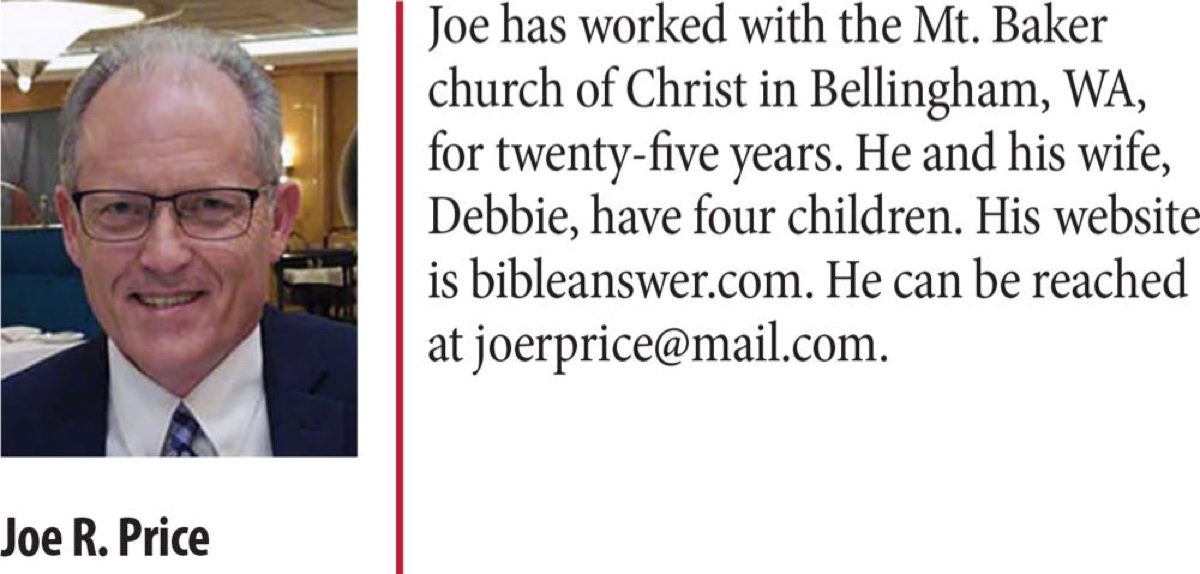by Joe R. Price
Synopsis: Using instrumental music to promote the gospel and entertain corrupts the Christian’s influence and worship.
An unknown number of brethren received the following email in 2011:
What are your thoughts on hymns with instrumental accompaniment, as a form of entertainment? How about a Christian performing spiritual songs with instrumentation? I am looking for any and all opinions on the subject, and would be most grateful if you would be willing to share your opinions with me.
This subject remains relevant ten years later. Some brethren use instrumental music to advertise churches and Bible teaching events on the radio and the internet. (If one may promote the gospel with an instrumental accompaniment, why not use an instrumental accompaniment during a gospel invitation to prompt people to obey Jesus? Where is the stopping point? Only in man’s imagination where such additions to God’s word began.) In addition, an increasing number of churches of Christ are adding instrumental music to their worship services. This subject deserves our diligent Bible study, not to entrench ourselves in “Church of Christ tradition” or personal opinions, but to seek, find, and apply the will of God (Matt. 28:20).
My reply to the above email from ten years ago (with minor changes and elaborations) follows:
The Scriptures reveal God’s truth on this matter. To that extent, therefore, this is a matter of faith—not opinion. Such clarification is needed, especially since you asked for “opinions on the subject.” I intend to be careful not to offer a personal opinion but what God’s word teaches on this vital subject (Eph. 3:3-4; 5:17). The worship-related nature of the topic you raise makes it clear that the issue is not one’s opinion, but rather, “What do the Scriptures say? If I misapply the Scriptures, please point it out for my careful consideration and correction where needed.
First, one must establish the Bible authority for adding instrumental music to the singing of hymns (1 Thess. 5:21-22; Eph. 5:19). Also, one must provide the Bible authority to remove singing and replace it with playing hymns. The exclusive New Testament pattern of singing binds us to sing and does not allow for alterations. To add playing, regardless of the purpose, violates the authority of Christ (Col. 3:17; 2 John 9).
Secondly, “songs and hymns and spiritual songs” are designed for worship, not entertainment (Eph. 5:19; Col. 3:16; Heb. 2:12; Jas. 5:13). The whole notion of performing hymns and spiritual songs as entertainment is foreign to the word of God. That purpose is an addition made by men. Adding musical performance for entertainment to the God-given purpose of music for worship goes beyond what God has written (1 Cor. 4:6; 2 Tim. 3:16-17; Gal. 1:6-10).
Thirdly, to turn the worship activity of singing into a form of entertainment is an act of irreverence, not worship (John 4:24). In truth, turning any act of worship into entertainment is will-worship (i.e., self-made worship) akin to when Nadab and Abihu offered “profane fire” to the Lord that He had not commanded (Lev. 10:1-3; Col. 2:23). In this case, the difference includes the addition being for people (to entertain them) and not for the Lord. We would not dream of offering prayers as “entertainment,” for such would make a mockery of God and prayer. Similarly, changing the music God approves by adding instruments, then altering its purpose from worship to entertainment, becomes acts of disobedient, irreverent, vain worship (John 4:23-24; Matt. 15:7-9). These innovations are not the will of the Father (Matt. 7:21-23).
Fourthly, Ephesians 5:19, Colossians 3:16, and the other New Testament passages that address musical worship exclude solos, quartets, and other entertainment performances. The silence of the Scriptures on the topic does not give us consent but is God’s constraint against sinful errors. When we sing, Christians speak to “one another” and teach and admonish “one another.” All are engaged in speaking, teaching, and admonishing through song. This interaction of saints, blending their voices in praise to God, is the worship God wants. By doing so, we engage in concurrent instruction, admonition, and praise. Yes, individuals may sing praises of joy (Jas. 5:13). However, worship is not a performance for the mere enjoyment of the participants. Remember, worship is not entertainment; rather, it is homage given to God.
Finally, Christians who use instrumental music (with or without vocal accompaniment) to advertise, promote, and even worship should consider their influence when doing so (1 Pet. 2:11-12). These actions leave an impression that God agrees with the instrumental presentation of the gospel. Those who practice this will have a hard time teaching others that singing is the only God-approved music for worship when their behavior has (1) used instrumental music to introduce them to the gospel, and/or (2) added entertainment as another purpose of worship music. By doing so, we tarnish influence for the truth of the gospel while those who use instrumental music in worship applaud such (unscriptural) changes. By such actions, Christians become the innovators’ excuse to continue using instrumental music in worship vainly (cf. Rom. 2:23-24). You have taught them it is okay to offer God worship which He has not commanded. That is an unenviable position for any Christian (2 Cor. 6:14-7:1).
My brethren, we must not view worship as a matter of opinion, custom, and tradition shaped and molded by human preferences and rationalizations. Emboldening the alteration of God-revealed worship for unscriptural practices, devised and endorsed by men, is a sin against God and jeopardizes souls (Acts 17:29; Rom. 1:21-23; Col. 2:8). While the aids we employ to expedite worship will change from time to time, they will not alter the authorized worship that honors God (John 4:23-24; Col. 3:17). Instrumental arrangements of songs, hymns, and spiritual songs corrupt the action and purpose of musical worship. We must refuse the enticement to be like all the nations around us. As God’s “own special people,” we must follow His will (1 Sam. 8:4-7; 1 Pet. 2:9). Altering God’s revealed and approved worship is off limits (Gal. 1:8-10; 2 John 9-10). God’s word reveals true, acceptable worship. Christians are bound by faith in Christ to offer it to God (John 4:24).


